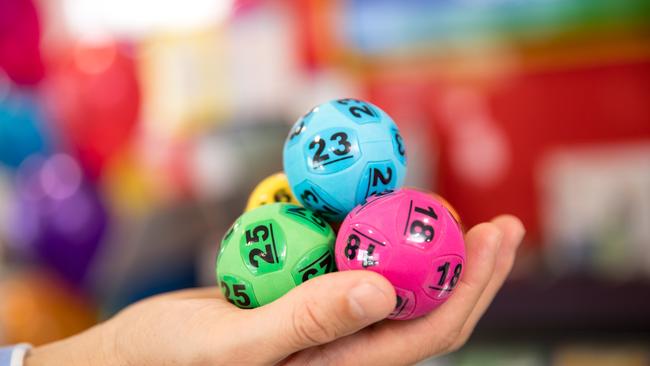Barefoot Investor: Why winning the lottery may not make you any happier
THE odds of winning Powerball are 76,676,600 to one. Today we’re going to meet that one. A married couple hit the jackpot, collected $3 million tax-free, but I decided to be a total wet blanket and told them they’d likely be less happy in three years’ time than they are right now. Blink. Blink. How could that be?
Barefoot Investor
Don't miss out on the headlines from Barefoot Investor. Followed categories will be added to My News.
IF you think winning the lottery would solve all of your life’s problems, Barefoot Investor wants you to think again.
WOULD WINNING LOTTO REALLY MAKE YOU ANY HAPPIER?
The odds of winning Powerball are 76,676,600 to one.
Today we’re going to meet that one.
A married couple hit the jackpot, collected $3 million tax-free … and contacted me.
For privacy’s sake, let’s call them Donald and Melania.
Yet while they were giddy with excitement, I decided to be a total wet blanket.
I told them the odds were high that they’d be less happy in three years’ time than they are right now.
Blink. Blink. How could that be?

Well, Philip Brickman and Dan Coates of Northwestern University did a famous study where they tracked the happiness of two very different groups: people who’d just won the lottery, and people who’d become paralysed after an accident.
Three years after, they checked back in to see how the study participants were faring. The results were startling: participants in both groups had more or less reverted back to their pre-existing mental state.
Shrinks call this phenomenon ‘hedonic adaptation’, which is a fancy way of saying that our brains are hardwired to adapt to circumstances (good or bad), and that ultimately we’ll be no happier than we were before.
The reason lotto winners can be even worse off is because of all the stress the money brings: worrying what to do with it, worrying that you’ll waste it (a-la MC Hammer’s gold-plated gates), and fending off people who expect a piece of the pie.
So, here’s what I advised ‘Donald and Melania’ to do.
First, don’t tell anyone. Second, seriously, don’t tell anyone. Nothing good will come of it. You didn’t earn it, and some people will think you don’t deserve it. It’ll cause resentment, envy, and conflict with the people you love.
Third, if Liz (my wife) and I were in your situation, we’d put in place a simple financial plan: clear all your debts, consider putting $100,000 in a Mojo account, make after-tax contributions to your low-cost super fund, and then set up a family trust and invest the proceeds into low-cost share funds — and live off the dividends.
Finally, if you want to feel great and not have all the hang-ups, donate some money anonymously.
You’ve beaten the odds once on the lotto, but to be a happy winner you’re going to need to beat them again.
Tread Your Own Path!
AM I DATING A DUD?
LISA ASKS: Help me, Scott! I am in my mid-30s, have read your book, and am in the process of turning my financial situation around ‒ something very important to me as I have no inheritance or safety net. I started dating a great guy who is 40 years old and self-employed. I recently discovered he has ZERO super, as he has never paid into it. He also has ZERO savings and lives pay cheque to pay cheque on a very tight budget (business not going so well). His situation terrifies me. Has he left it too late?
BAREFOOT REPLIES: So you want to know whether you’re dating a financial dud?
That’s a perfectly reasonable question to ask of someone you’re considering making your life partner, especially when you’re getting down to the business end of the season.
The good news is that he hasn’t left it too late to turn himself around. He can do it, especially with what Huey Lewis calls ‘The Power of Love’. (I’m listening to this song on Spotify now ‒ eighties rock at it finest.)
The bad news is that, if you try to tell him this, he might just nod his head, tell you what you want to hear … and do nothing. (Guys are good at that.)
So let’s you and I cook up a script that belongs in an eighties rom-com.
Take him out to dinner. Explain to him that it’s really important to you to be with someone who has their stuff sorted. Give him a copy of my book. Ask him to read it. Check back with him in two months. If he hasn’t read it, you have your answer.

STRIPPING OUT THE TAX
NICK ASKS: I have a question regarding my partner’s second job ‒ she is an erotic dancer. What do we need to do with her earnings?
She keeps all the receipts she gets from dancing, but tips are paid in cash. She also keeps receipts of things she buys for the job.
How do we incorporate this other income, and what steps should we take to make this happen?
BAREFOOT REPLIES: Being a stripper is the ultimate cash business ‒ I mean her clients literally throw money at her.
But how can the ATO figure it out if she doesn’t declare it?
Can you imagine Colin from the Australian Taxation Office staking out a strip club and checking to see whether she declares her tips?
Well, in actual fact, the ATO data-matches billions of transactions, and they routinely target people working in professions where cash is received.
So, have her report her tips in her personal tax return (usually at Item 2: ‘Allowances, earnings, tips and director’s fees’) and make sure she claims any legitimate work-related deductions (lingerie and the like), as with any other job.

I’M SUPPORTING A GAMBLING HABIT ... MY HUSBAND’S
CANDICE ASKS: I have bought your book — thank you — and I now want to set up my buckets. We used to have joint bank accounts, but my husband has gambling/spending problems so I control the accounts (though he does have an AMEX, hard to make him get rid of it).
My question is, when opening my new ING accounts should I make them joint or in my name only? We have had to sell our home, our money is draining, he is not working, and our rent is high, so I am desperate to start. But I am so confused and feel like a failure.
BAREFOOT INVESTOR: You are not a failure.
You’ve been to hell and back, and not only are you still standing, you’re doggedly moving forward.
Now there’s an elephant in your living room: your husband is an addicted gambler, and he has a credit card.
That’s like an alcoholic keeping a sixpack in the fridge!
My advice to him? Admit his problem, cut up and cancel the credit card (if it’s in joint names, you’ll both have to sign to cancel it), and call the Gambling Helpline on 1800 858 858.
My advice to you? Protect yourself.
From this point on, keep your finances completely separate. Keep the ING accounts in your name only, and pay the household bills from that account.
If the AMEX is in both your names, you’ll both need to sign and cancel it.
Do not give him any money, and tell your family and friends not to give or lend him any either.
One more thing: even strong people like you need support. Give the Gambling Helpline a call yourself and seek out a support group of people dealing with the same challenges.
Sadly, there are a lot of people in your situation: Aussies lose more money per head on gambling than any other people on the planet.
THANKS DAD
TOM SAYS: This is not a question — I just wanted to explain the impact you have made on my family.
I lost my mum three years ago, and I buried my dad yesterday. He was 89 and had no financial idea. I am an only child and we had a difficult relationship.
However, I have the most beautiful videos on my phone that I took after reading your email about dads on Father’s Day. I asked him those important questions and he opened up, and I played one of the videos at the end of the funeral service.
No matter what else I achieve — or learn from your book and newspaper column — it will always have been worthwhile. I do hope you hear my message of thanks.
BAREFOOT REPLIES: Thanks for writing, and sharing your awesome story.
For those readers who don’t know what Tom’s referring to, this is what I wrote about:
I called it the Ultimate Father’s Day Present.
You whip out your phone, hit ‘record’, and ask your dad the following questions:
1. How did you meet Mum?
2. What advice can you share with me about money, life and happiness?
3. What does being a dad mean to you?
4. What are you most proud of?
5. How would you like to be remembered?
Just like Tom, one day it’s all you’ll have left of him. And you’ll treasure it.
And guess what? It works just as well with mums. Which is timely, because it’s Mother’s Day next Sunday. (But you remembered that, right?)
If you have a burning money question, go to barefootinvestor.com and #askbarefoot.
**The Barefoot Investor holds an Australian Financial Services Licence (302081). This is general advice only. It should not replace individual, independent, personal financial advice.
Originally published as Barefoot Investor: Why winning the lottery may not make you any happier


